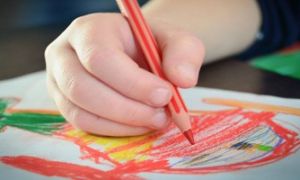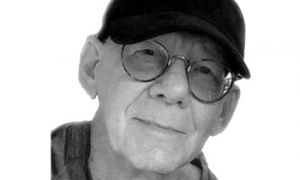Your preschooler is now able to focus their attention more accurately and is less influenced by distractions. The intensity of questions increase as your child develops a strong curiosity for the world around them. By this stage, your child will have increased memory skills which counts for a big part of their learning. Your preschooler will also be able to retain two or three pieces of information while acting on them.
Cognitive Development Milestones
- describes pictures in detail
- able to identify and name primary colours
- understands concepts of sorting, grouping and matching
- recognizes own name in print
- increased concentration
- begins to draw a person adding much detail to the body
- counts chronologically from 1 to 10
- can count 10 or more objects
- understands the concept of time
- knows their physical address and home telephone number
- makes their own rhyming words
- mimic sounds and creates their own sounds or words
- learns rules of behaviour and reasons behind them
- understands opposites (e.g. big/little)
- understands positional words (middle, end)
- uses objects and materials to build or construct things, e.g. block tower, puzzle, clay, sand and water
- builds a tower eight to ten blocks
- answers simple questions
- counts five to ten things
- has a longer attention span
- talks to self during play - to help guide what he/she does
- follows simple instructions
- follows simple rules and enjoys helping
- may write some numbers and letters
- engages in dramatic play, taking on pretend character roles recalls events correctly
- touches objects to count
- starts to understand relationship between numbers and objects
- can recount a recent story
- copies letters and may write some
- identify and name secondary colours
- learns through observations and social interactions
- understands order and process
- recognizes most letters of the alphabet
- knows what common objects are used for
By now, preschoolers have a higher level of concentration which will enable them to complete and engage in more challenging tasks. A genuine understanding of numbers develops and preschoolers will begin to consider concepts such as shapes and colours in more detail.


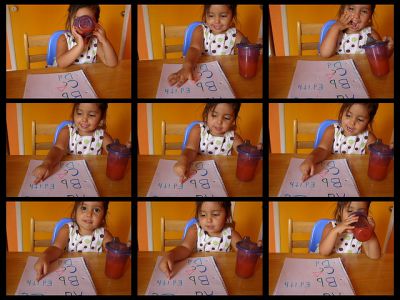
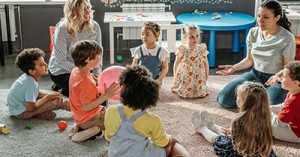
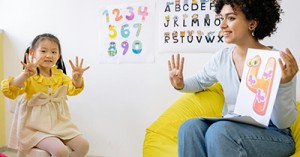

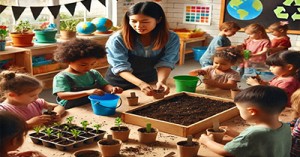
 Toddlers have a greater understanding of the world around them by this stage. Their cognitive development (also known as intellectual development and thinking skills) continues
Toddlers have a greater understanding of the world around them by this stage. Their cognitive development (also known as intellectual development and thinking skills) continues Infants begin to develop trust when parents begin to fulfil their needs. Such as changing an infant's nappy when needed, feeding on request and holding
Infants begin to develop trust when parents begin to fulfil their needs. Such as changing an infant's nappy when needed, feeding on request and holding Beginning at birth the construction of thought processes, such as memory, problem solving, exploration of objects etc, is an important part of an infant’s cognitive
Beginning at birth the construction of thought processes, such as memory, problem solving, exploration of objects etc, is an important part of an infant’s cognitive Toddlers want to do more on their own and do not like it when you begin to establish limits on their behaviour. Tantrums can become
Toddlers want to do more on their own and do not like it when you begin to establish limits on their behaviour. Tantrums can become Your preschooler is now able to focus their attention more accurately and is less influenced by distractions. The intensity of questions increase as your child
Your preschooler is now able to focus their attention more accurately and is less influenced by distractions. The intensity of questions increase as your child John Dewey is often seen as the proponent of learning by doing – rather than learning by passively receiving. He believed that each child was active,
John Dewey is often seen as the proponent of learning by doing – rather than learning by passively receiving. He believed that each child was active, Toddler advance and gains new skills in Gross Motor Development milestones achieved throughout earlier years. Co-ordination and challenges that could not be performed before such
Toddler advance and gains new skills in Gross Motor Development milestones achieved throughout earlier years. Co-ordination and challenges that could not be performed before such Erik Erikson developed a psychosocial theory to understand how we each develop our identities through eight stages of psychosocial development from infancy to adulthood. The
Erik Erikson developed a psychosocial theory to understand how we each develop our identities through eight stages of psychosocial development from infancy to adulthood. The At this point preschoolers begin to interact effectively with others. Play becomes more innovative and organized and “boyfriend” or “girlfriend” begins to emerge. Preschoolers have
At this point preschoolers begin to interact effectively with others. Play becomes more innovative and organized and “boyfriend” or “girlfriend” begins to emerge. Preschoolers have From now, babies begin to identify and respond to their own feelings, understanding other's feelings & needs and interact positively with others. A baby's social and
From now, babies begin to identify and respond to their own feelings, understanding other's feelings & needs and interact positively with others. A baby's social and